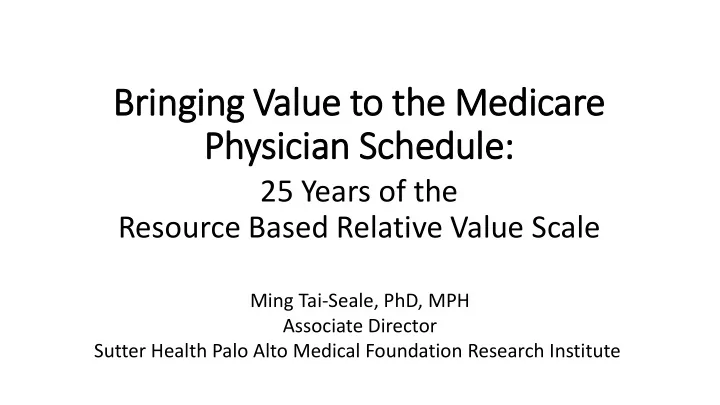

Bringing Value to the Medicare Physician Schedule: 25 Years of the Resource Based Relative Value Scale Ming Tai-Seale, PhD, MPH Associate Director Sutter Health Palo Alto Medical Foundation Research Institute
Background • P hysician effort is a crucial resource • Agent’s work effort is often viewed as unobservable • Previous/ongoing efforts to study MD work • Resource Based Relative Value Scale 1 • National Ambulatory Medical Care Survey 2 • Time Allocation in Primary Care Office Visits 3 • What’s keeping physicians busy 4 • Aim: • To describe how individual PCPs allocate time on different ambulatory care activities, • by reviewing “access logs” (i.e., stamps) generated by an EHR 1 Hsiao et al 1988 JAMA; 2 Mechanic et al 2001 NEJM; 3 Tai-Seale et al HSR 2007; 4 Baron 2010 NEJM
EHR Access Log 765,129/ 471 PCPs 637,769 PTs 31,002,888 Time Blocks 4 years IM, FM, & PED (2011-2014)
What Does the Log Capture? Discrete, time-stamped actions associated with patient care, by: Begin/End User Time Device Patient
An Illustrative Work Day 90 th percentile Mean S.D. Median Number of F2F Visits/day/MD 13.5 6.2 13 21
Tai-Seale et al, April 2017, Health Affairs.
Family Medicine Internal Medicine Pediatrics Face-to-face Progress note Telephone encounters Obstetrics/Gynecology Secure messages Prescription refills Other Dermatology Radiology Geriatric Medicine 0 1 2 3 4 5 6 7
InBasket Messages/Week Mean Msg/week 450 400 350 300 250 200 150 100 50 0 Other Non-procedural Other Procedural Shift/Non-Scheduled OBGYN PEDS FM IM Specialties Specialties Specialties Mean Msg/week
Volume 3 Chapter 8 Physician Management of Demand at the Point of Care M Tai-Seale 2014
Implications Monitoring Incentives Leverage Access Log Data
Recommend
More recommend